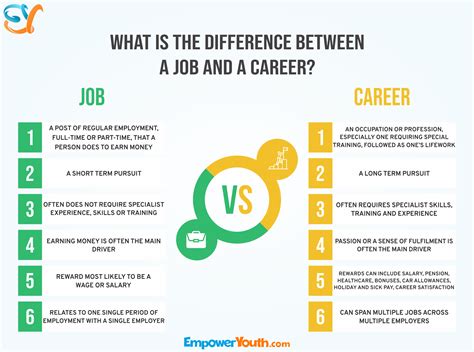Understanding the Distinction
Navigating the complexities of the modern workforce requires a clear understanding of the fundamental differences between a job and a career. While often used interchangeably, these terms encompass distinct concepts with varying implications for personal fulfillment, professional growth, and financial stability.

Job vs. Career: Key Differences
| Feature | Job | Career |
|---|---|---|
| Purpose | Short-term financial gain | Long-term professional growth and development |
| Motivation | Driven by immediate income | Driven by passion, purpose, and advancement |
| Goals | Specific tasks or responsibilities | Progression, knowledge acquisition, and skill development |
| Investment | Minimal investment of time and effort | Substantial investment in education, training, and networking |
| Job Market | Fluctuating with economic conditions | Relatively stable, with opportunities for advancement |
Characteristics of a Job
1. Task-Oriented:
Jobs typically involve performing specific, prescribed tasks with limited opportunity for independent decision-making.
2. Temporary:
Jobs are often short-term or project-based, with no guarantee of long-term employment or stability.
3. Income-Driven:
The primary motivation for holding a job is financial compensation, often at a minimum wage or hourly rate.
4. Limited Growth Potential:
Jobs typically offer limited opportunities for professional development or advancement, as promotions and salary increases are often based on tenure rather than merit.
Characteristics of a Career
1. Passion-Driven:
Careers are fueled by a deep interest, passion, or purpose in a particular field or industry.
2. Long-Term Focus:
Careers are built over time through sustained effort, education, and networking. They involve a commitment to long-term professional development and growth.
3. Skill-Based:
Careers require the acquisition and continuous refinement of specialized skills, knowledge, and expertise. Advancement is based on merit and the development of these skills.
4. Growth Potential:
Careers offer ample opportunities for professional growth and advancement, leading to higher levels of responsibility, income, and influence.
Benefits of a Career vs. a Job
| Benefit | Career | Job |
|---|---|---|
| Fulfillment: Provides a sense of purpose, meaning, and accomplishment | Limited personal satisfaction | |
| Growth: Promotes professional development and advancement | Stagnant or limited growth | |
| Financial Stability: Offers opportunities for higher income and long-term financial security | Unpredictable income or low earning potential | |
| Social Impact: Allows individuals to make a meaningful contribution to their field or society | Minimal impact or limited social value | |
| Work-Life Balance: Enables greater flexibility and control over work schedule | Often inflexible hours or work-life conflict |
Transitioning from a Job to a Career
Transitioning from a job to a career requires strategic planning and a commitment to professional development. Here are some effective strategies:
1. Identify Your Interests and Passions:
Explore your interests and identify fields that ignite your passion and purpose.
2. Pursue Education and Training:
Acquire the necessary education, skills, and certifications to qualify for your desired career.
3. Network and Build Relationships:
Attend industry events, join professional organizations, and connect with individuals in your field.
4. Seek Mentorship and Guidance:
Find experienced professionals who can provide guidance, support, and advice as you navigate your career path.
5. Set Goals and Track Progress:
Establish clear career goals and track your progress to stay motivated and focused on your aspirations.
FAQs
1. Is it possible to have both a job and a career?
Yes, it is possible to hold a part-time or temporary job while pursuing your career aspirations.
2. How can I know if I am in a job or a career?
Consider the factors discussed earlier, such as purpose, motivation, growth potential, and overall satisfaction.
3. Is it too late to start a career?
No, it is never too late to pursue your professional aspirations. With planning and effort, you can make a successful career transition at any stage of life.
4. What are the most common career fields?
According to the U.S. Bureau of Labor Statistics, the most common career fields include healthcare, education, retail, and transportation.
5. What are the highest-paying career fields?
The highest-paying career fields typically require advanced education and specialized skills, such as medicine, law, engineering, and finance.
6. What are the best career options for the future?
Careers in technology, healthcare, and green energy are projected to experience high growth in the coming years.
7. How can I find a job or career that is a good fit for me?
Explore job and career search engines, consult with career counselors, and network with individuals in your field of interest.
8. What is the difference between a career counselor and a career coach?
A career counselor provides guidance and support on career exploration, job search strategies, and educational opportunities, while a career coach focuses on personal development, goal setting, and professional growth.
